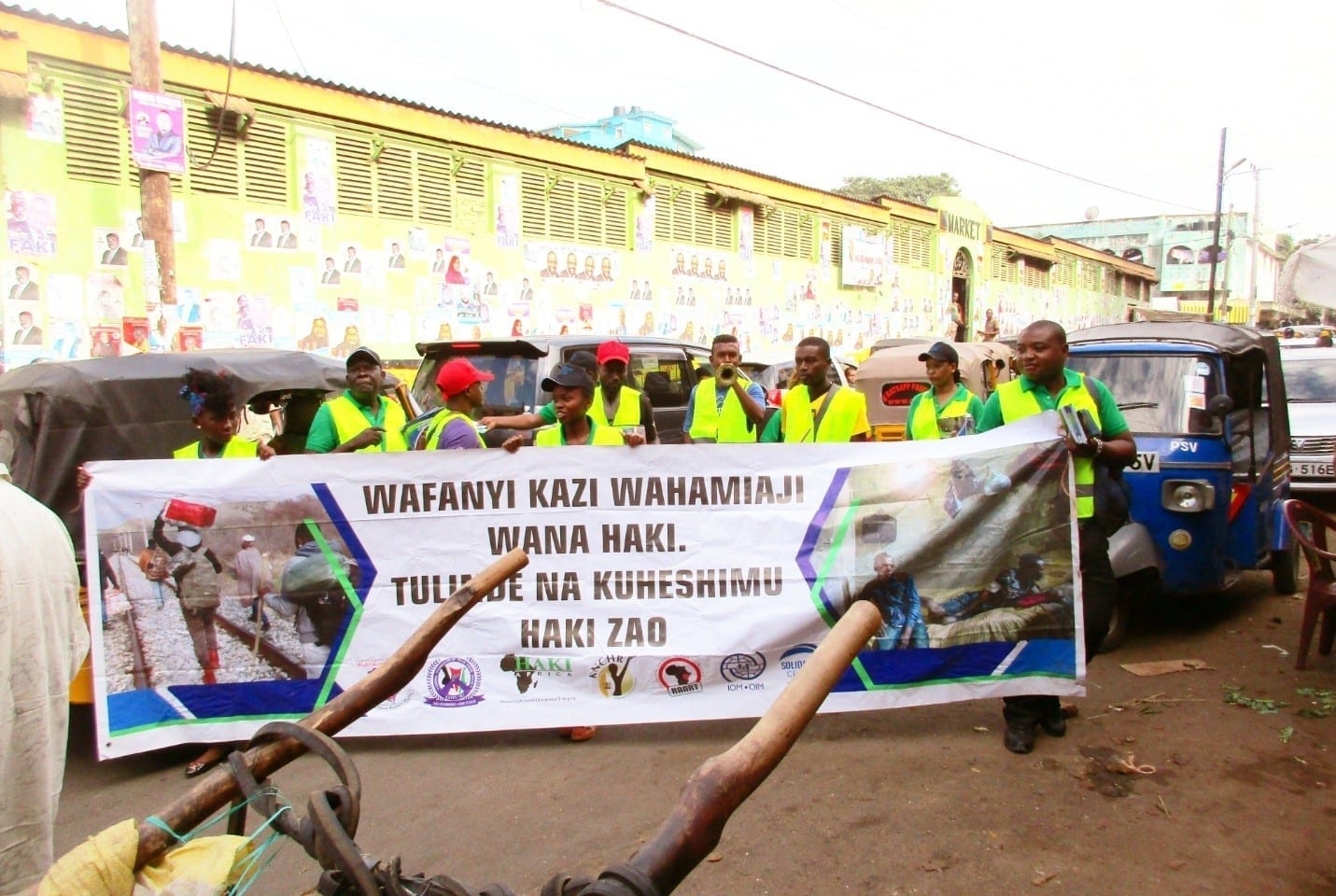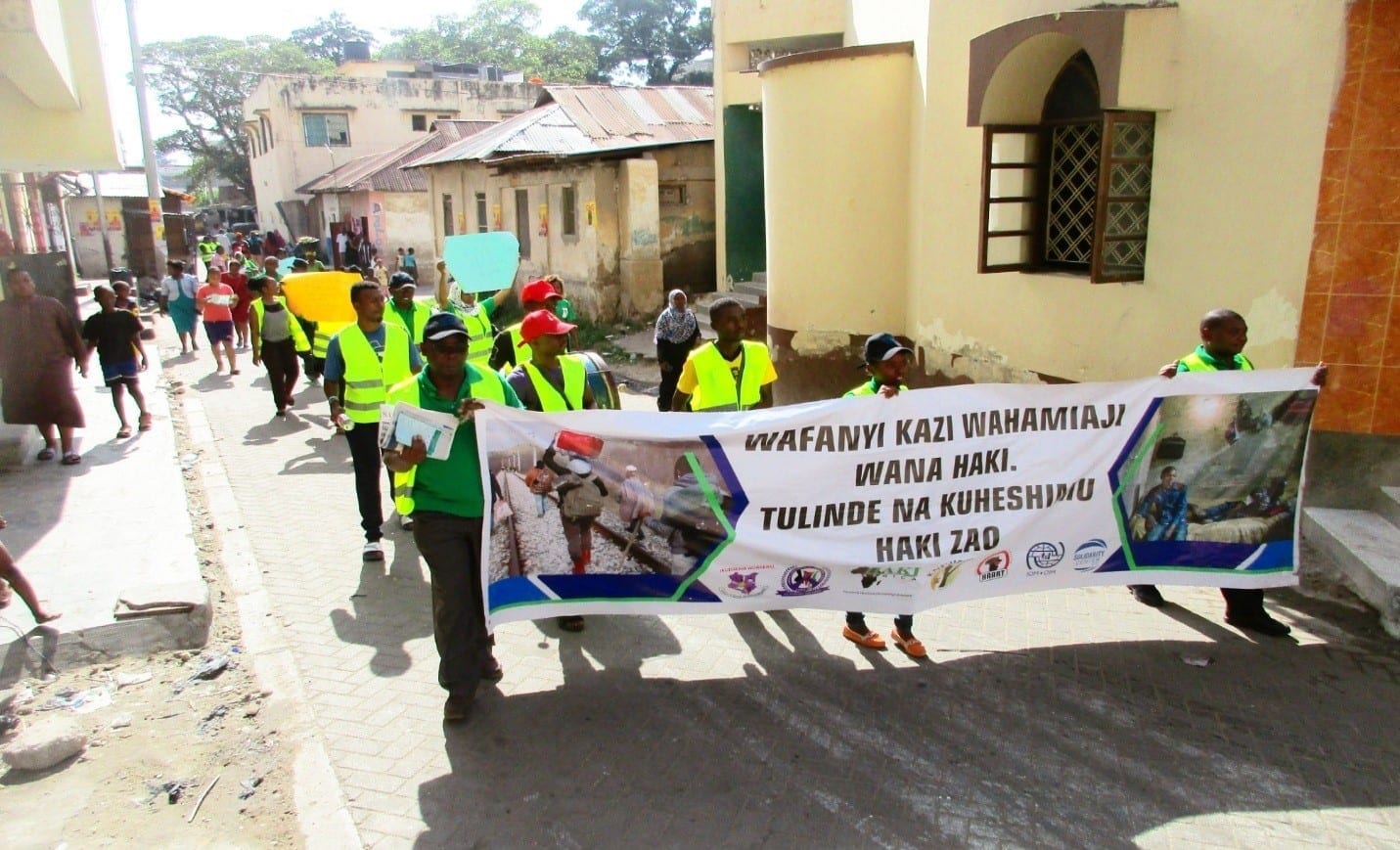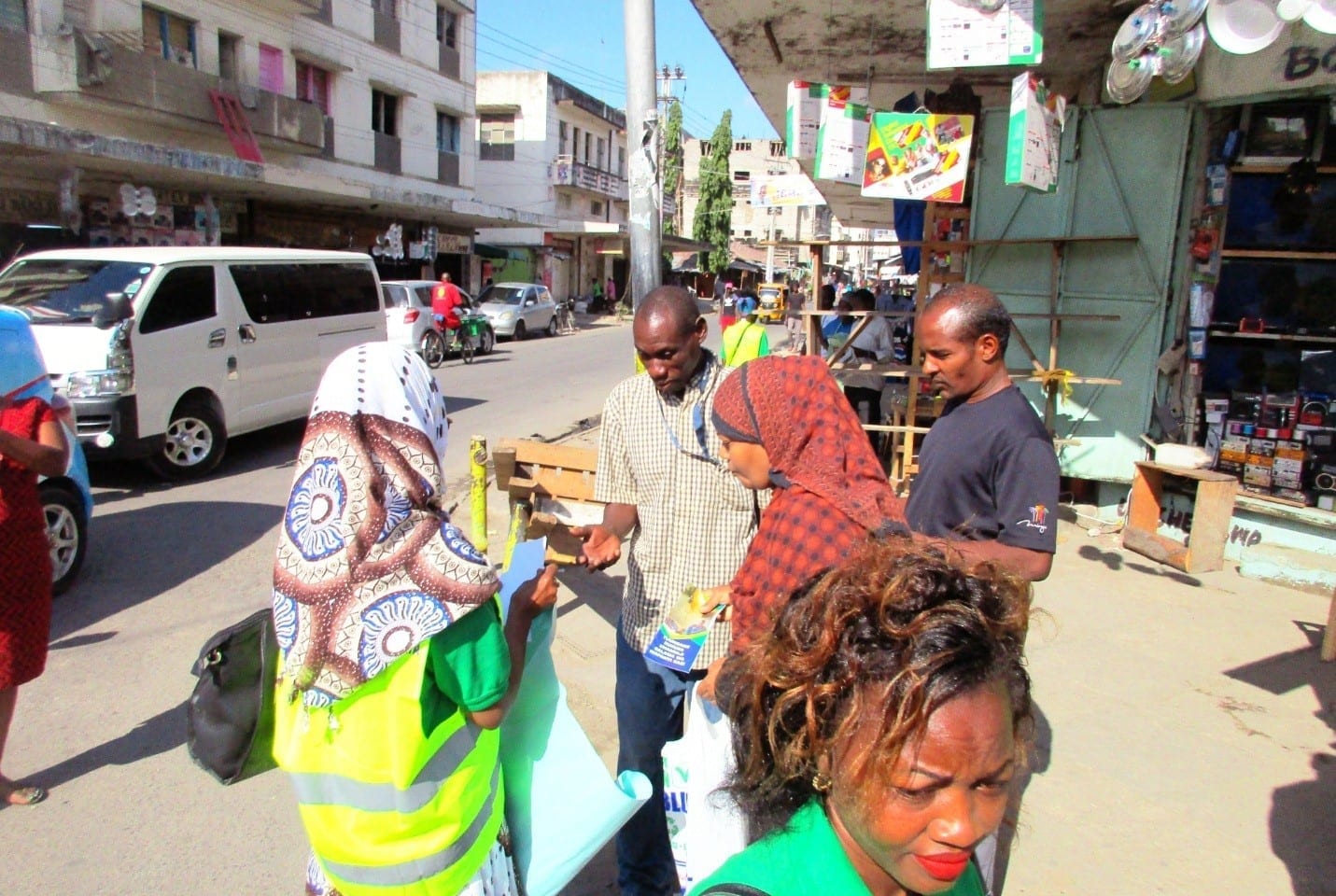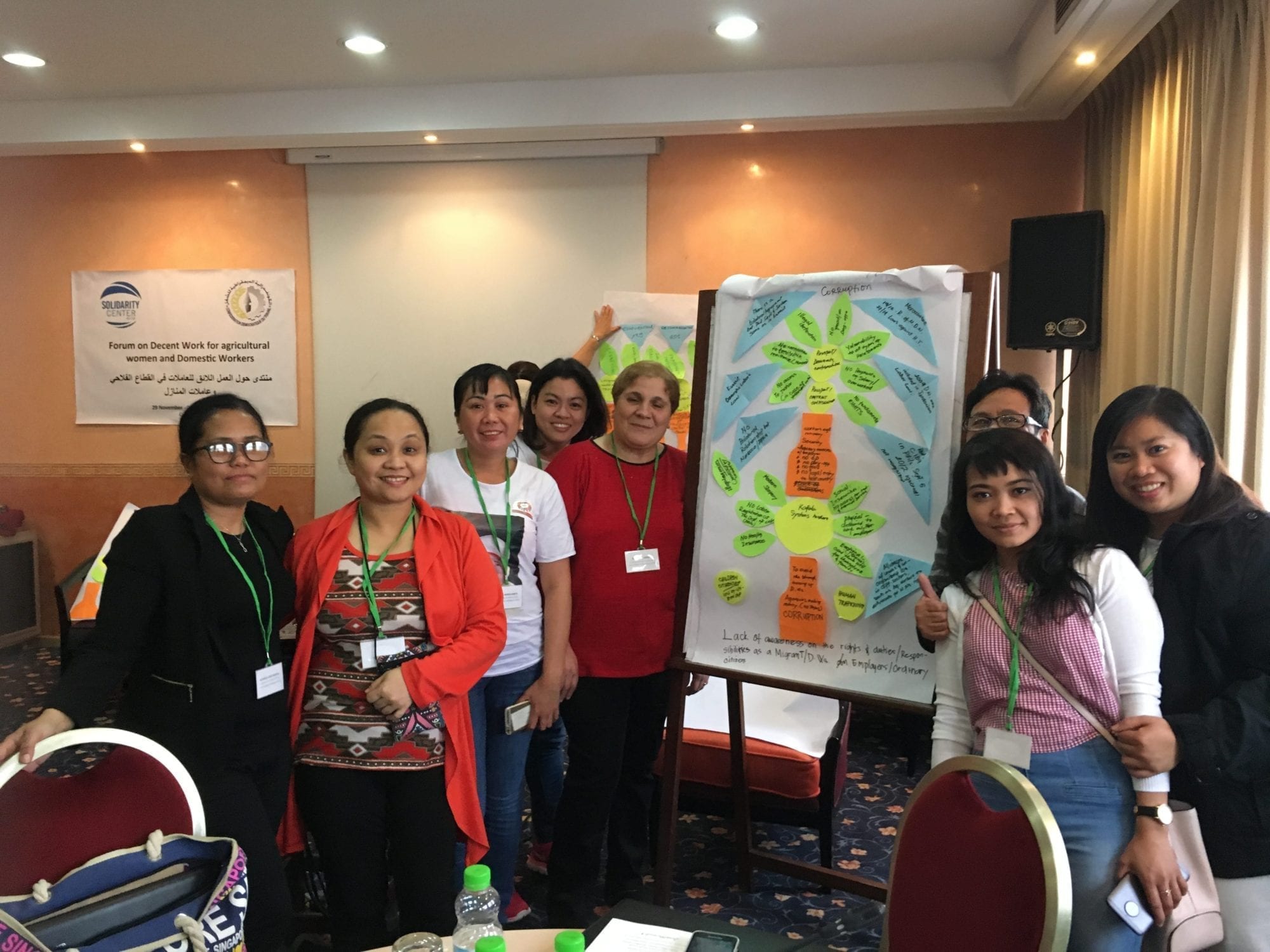
Nov 30, 2017
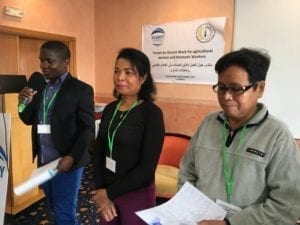
Romaric Hocine, Marie Constant and Adoracion Salvador Bunag shared domestic workers’ success stories. Credit: Solidarity Center/Tula Connell
Following heartfelt rounds of songs on workers’ struggles and union solidarity, some 30 worker rights advocates launched the second day of the Forum on Decent Work for Agricultural Women and Domestic Workers. Discussions centered on the lack of migrant worker rights and the commonalities between the treatment of domestic workers and farm workers, and participants concluded the day by sharing success stories and best practices from around the world.
The November 29–December 1 forum in Casablanca, sponsored by the Solidarity Center and the Democratic Labor Confederation (CDT) in Morocco, includes representatives of unions and worker associations from Jordan, Kuwait, Lebanon and Morocco.
“We have to be aware of all the different ways our employers and governments try to divide us from each other,” says Erin Radford, Solidarity Center senior program officer for North Africa, opening the conference with small group discussions.
In conversation with each other and together as a group, forum participants explored how migrant workers often are paid lower wages than a country’s standard minimum wage, are prohibited from forming unions and typically are not covered by basic social protections, like pensions. Gender also is a key dividing line at work, and participants shared how women are treated as lesser than men at work, even as they take on most of the care burden at home.
These divisions, says Radford, are how employers “can increase their control over workers and exploit them.”
‘Labor Is Not a Commodity’
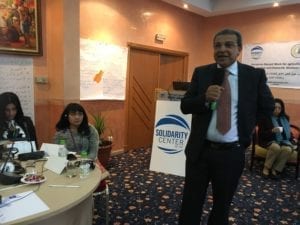
‘Labor is not a commodity’—Mohamed Korri, labor relations expert and former consultant in the agricultural sector. Credit: Solidarity Center/Tula Connell
Divisions in labor rights between farm workers and non-farm workers are especially acute in Morocco, says Mohamed Korri, a labor relations expert and former consultant in the agricultural sector. As part of a panel presentation with experts on decent work and migration, Korri listed the ways in which farm workers have fewer rights and protections than other workers: they are paid less than the standard minimum wage, they are not eligible for paid holidays and they face such strict pension restrictions they rarely qualify for paid retirement.
There is little incentive for legislators to improve the laws, he said, because many own farms and benefit from worker exploitation. “Labor is not a product, not a commodity and must be treated humanly,” he says.
Also on the panel, Bachir Znagui, a media professor from the HEM Research Center, overviewed the conditions of domestic workers and migrant workers in Morocco and the international conventions covering their rights, and shared best practices from countries around the world, including Uruguay, which requires labor inspections of the homes of those employing domestic workers.
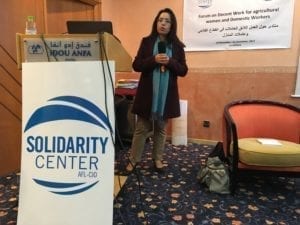
Freedom to form unions is a key pillar of decent work, says Fatima Idahmad, ILO representative in Morocco. Caption: Solidarity Center/Tula Connell
Znagui’s presentation showed that growing numbers of workers are forced out of formal-sector employment and into jobs with low wages and no social protections or job security—hitting women and migrant workers the hardest because they comprise the majority of workers in the informal economy. The increase in low-paying, temporary jobs is fueled by a rise of corporate rights and corresponding decrease in worker rights around the world.
Key to decent work is the freedom to form unions, the elimination of child labor and forced labor and the elimination of workplace discrimination, says Fatima Idahmad, national coordinator for the International Labor Organization (ILO) in Morocco. Idahmad highlighted how the ILO is raising awareness among workers about their rights throughout Morocco.
Strategies for Success
Working together—across organizations, job categories and countries—workers can push back against global corporate forces and unsupportive governments. And in sharing success stories, forum participants began crafting strategies to take back to their workplaces.
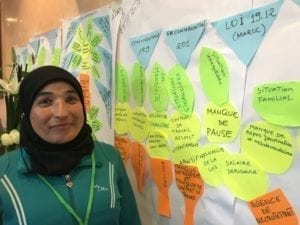
Farm worker and CDT member Hayat Khomsi says a union contract has completely transformed the conditions under which farm workers toil. Credit: Solidarity Center/Tula Connell
Marie Constant, a domestic worker in Lebanon originally from Madagascar, was among activists who led the formation a domestic workers’ union in that country, the first of its kind in the region. Constant described how union members, nearly all of whom are migrant workers, receive key support from National Federation of Employees’ and Workers’ Unions in Lebanon (FENASOL).
“Even if we know we have a long way to go, that there are a lot of hurdles along the way, we are advancing not regressing,” she says, speaking through a translator.
A union contract has completely transformed the conditions under which farm workers toil on Les Domaines Brahim Zniber farm, says Hayat Khomsi, a farm worker in Meknes El Hajeb and activist with the CDT.
Under the landmark 2015 agreement, which now covers 1,200 workers on six farms, workers for the first time have formal employment contracts with job security, paid leave and other social protections. Crucially, women now have equality with men, enabling the women farm workers, who previously were blocked from “male” jobs, like truck driving, access to these generally higher paying jobs.
“Now we have achieved a similar status to that of the men,” says Khomsi. “Now I am a team leader and before no woman could have been a team leader.”
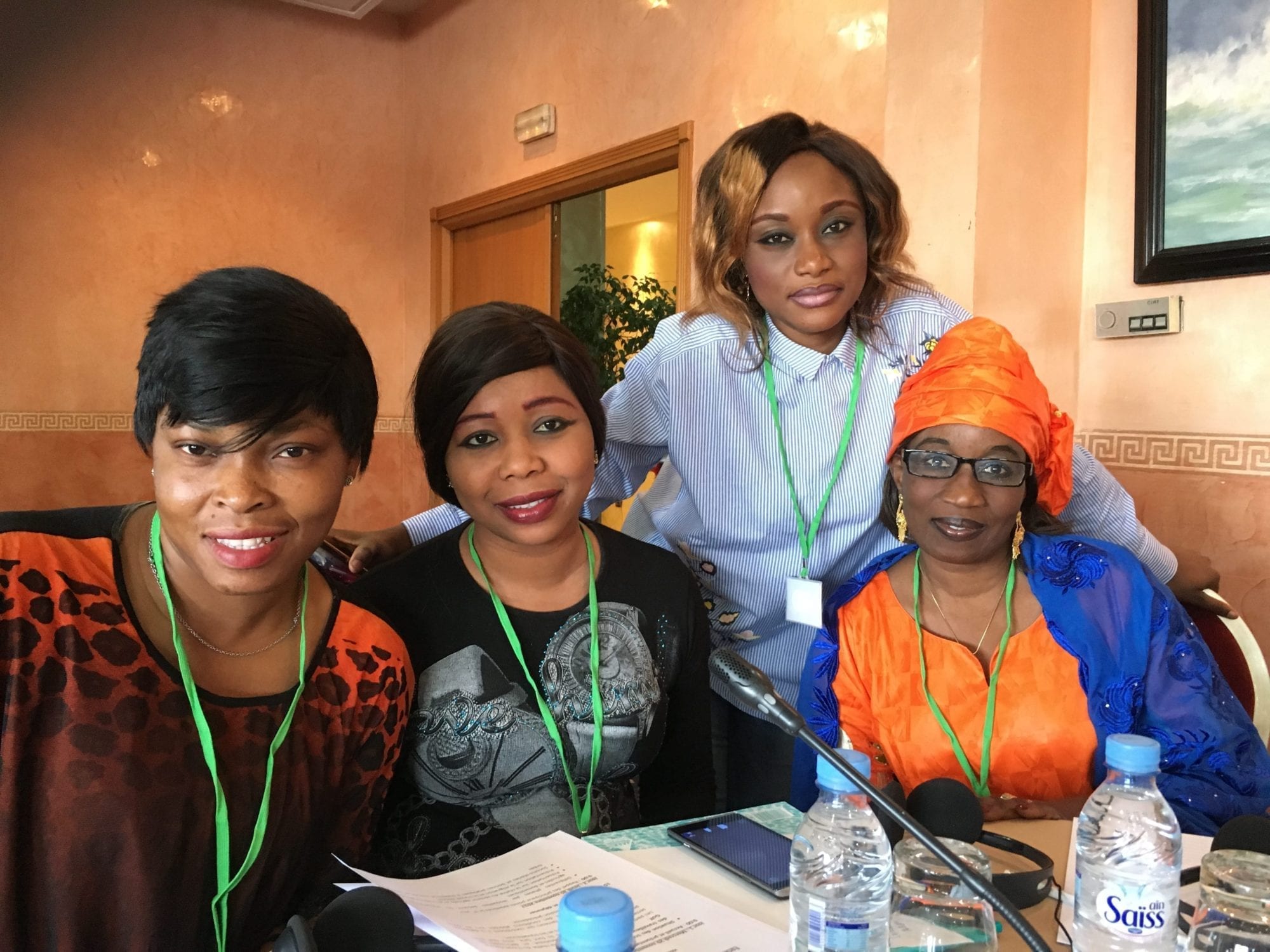
Nov 29, 2017
To promote the rights of women workers, especially women domestic workers and women farm workers, it is essential to seek solutions to build women’s capacity to defend their rights to equality, decent work and an end to violence and abuse, according to Hind Cherrouk, Solidarity Center director for North Africa as she opened a three-day forum in Casablanca, Morocco, this morning.
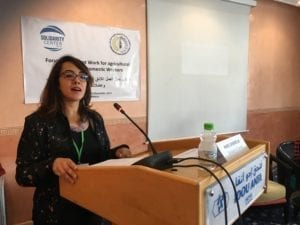
“This forum is an opportunity to build solidarity between women domestic workers and farm workers”–Hind Cherrouk, Solidarity Center program director for North Africa Credit: Solidarity Center/Tula Connell
“This forum is an opportunity to build solidarity between women domestic workers and farm workers,” says Cherrouk.
“We express our solidarity with our sisters who are migrants,” says Saida Bentahar. “We will always stretch our hands out to help them. We are going to remove the pressure of discrimination against our sisters wherever they are.” Bentahar, a Democratic Labor Confederation (CDT) women’s committee member, works to empower farm workers in Meknes El Hajeb, Morocco.
Some 30 worker rights advocates from countries that include Jordan, Kuwait, Lebanon and Morocco are meeting to discuss how such factors as gender, ethnicity and race are used to deny workers their rights and, ultimately, to build the connections and solidarity needed to take on the power structures that profit from their marginalization. The November 29–December 1 Forum on Decent Work for Agricultural Women and Domestic Workers is sponsored by the Solidarity Center and the CDT.
“If you don’t fight, nothing will happen,” says Elizabeth Tang, general secretary of the International Domestic Workers Federation. Tang, who spoke during the morning session, described how domestic workers around the world came together to fuel the 2011 passage of the International Labor Organization (ILO) Convention 189 on domestic workers, and later created IDWF.
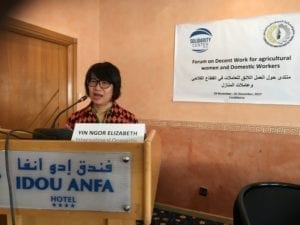
“If you don’t fight, nothing will happen”–Elizabeth Tang, IDWF secretary general Credit: Solidarity Center/Tula Connell
“If domestic workers stop fighting, then the convention will just be a nice looking paper,” says Tang. “So we decided to form a permanent union of domestic workers so we can keep fighting in unity so we can speak in one voice.” IDWF now includes 65 affiliated organizations in 53 countries.
More than half of the workers around the globe are not employed in the formal economy. Yet most informal economy workers, such as those cleaning houses and toiling on farms, have little access to decent work—which includes family-supporting wages, safe workplaces and social protections like paid time off and pensions. Decent work is one of the United Nation’s sustainable development goals, a series of targets the UN hopes to achieve by 2030.
Representing a range of unions and associations assisting workers throughout the Middle East and North Africa, participants described the challenges they face as domestic workers and agricultural workers and how, as worker rights activists, they are facilitating efforts through their organizations to achieve decent work.
Isolated in Homes, Domestic Workers Vulnerable to Abuse
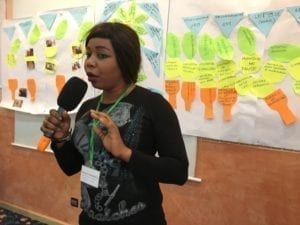
Camara Hassanatou, a domestic worker in Morocco, described how her employer forced her to work without rest. Credit: Solidarity Center/Tula Connell
Of the more than 150 million migrant workers in the world, 11.5 million are migrant domestic workers. Primarily women, domestic workers provide essential support to families, cleaning homes, cooking meals and taking care of children. Yet their isolation makes them especially vulnerable to abuse and exploitation.
“I asked my employer how long I will work,” says Camara Hassanatou, an African migrant worker in Morocco. “ ‘You will work as long as I tell you,’ she said.” Hassanatou accepted the job because she needed to support herself. Yet she received no time off, even when she was ill.
Now an activist with the Coalition of Migrant Workers in Morocco (CTMM), Hassanatou joined participants in small group discussions in which domestic workers and farm workers shared their challenges. The women discussed how migrant domestic workers often are recruited by labor brokers who lie to them about the wages and working conditions in destination countries. After they are arrive in another country, their passports and mobile phones often are taken, trapping them in employment situations where they often face physical and sexual abuse, while forced to work long hours with no time off.
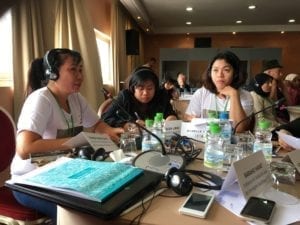
Former domestic workers from the Philippines were trafficked to Morocco and now are part of the Instance of Solidarity with Asian Workers. Credit: Solidarity Center/Tula Connell
Romaric Hocine, a member of the CTMM, which was formed in 2013, outlined how the organization works to educate migrant domestic workers about their rights. Under a recent legalization campaign by Morocco, migrant workers who have been employed for five years in the country, among other criteria, were eligible for amnesty if they applied in 2014 and 2015 and renewed in 2016. CTMM activists reached out to workers across the country to enable them to get formalize their status and attain basic rights.
Leadership training is central to the coalition’s work: “It is essential to develop leadership among migrant workers so they can defend their own rights,” he says.
From Kuwait, where two-thirds of its population is comprised of migrant workers, Mai al Tararwah, a lawyer with the Humanitarian Foundation for Legal Aid, described how a team of lawyers works to assist domestic workers and other migrants with legal support and vocational training. Farah Abdullah from the National Federation of Employees’ and Workers’ Unions in Lebanon (FENASOL) discussed the union’s objectives, which include creating “an independent structure for migrant domestic workers” in that country, where an estimated 250,000 migrant labor as domestic workers.
Farm Workers ‘Treated Like Slaves’
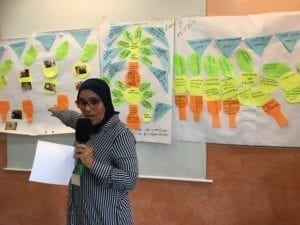
“Trade unions can reverse the factors that undermine vulnerable workers in society”–Saida Bentahar, a CDT women’s committee member Credit: Solidarity Center/Tula Connell
Many workers on agro-industrial complexes are seasonal employees and, like domestic workers in many countries around the world, they are not covered by national labor laws guaranteeing minimum wages and social protections like pensions and paid time off.
Rural women now contribute half of the world’s food and women in developing countries generate between 60 percent and 80 percent of the labor needed to produce food crops in developing countries.
Yet women working in agriculture “are being dismissed without pay, without severance, without justification with the stroke of the employer’s hand,” says Bentahar. “If they feel that the margins do not add up, employers will quickly lay off of women workers.”
Globalization has strengthened the negotiating hand of corporations at the head of supply chains. Faced with pressure to maximize profits, factory and farm managers typically pass on the costs and risks to the weakest links in the chain: the workers they employ.
Participants agreed that although domestic workers and farm workers may face different challenges, the common thread uniting their struggles is a lack of worker rights. But as Bentahar pointed out, unions provide a key path forward for many workers.
“Trade unions can reverse the factors that undermine vulnerable workers in society,” she says. “Our capital is our ablility to put pressure on our governments. We’d like your governments to put pressure on our governments to create momentum.”
“Things are changing,” says Tang. “You don’t have to look very far. Just look at yourselves.
“Together, we will make change.”
Stop back tomorrow for more coverage of the Forum on Decent Work for Agricultural Women and Domestic Workers.
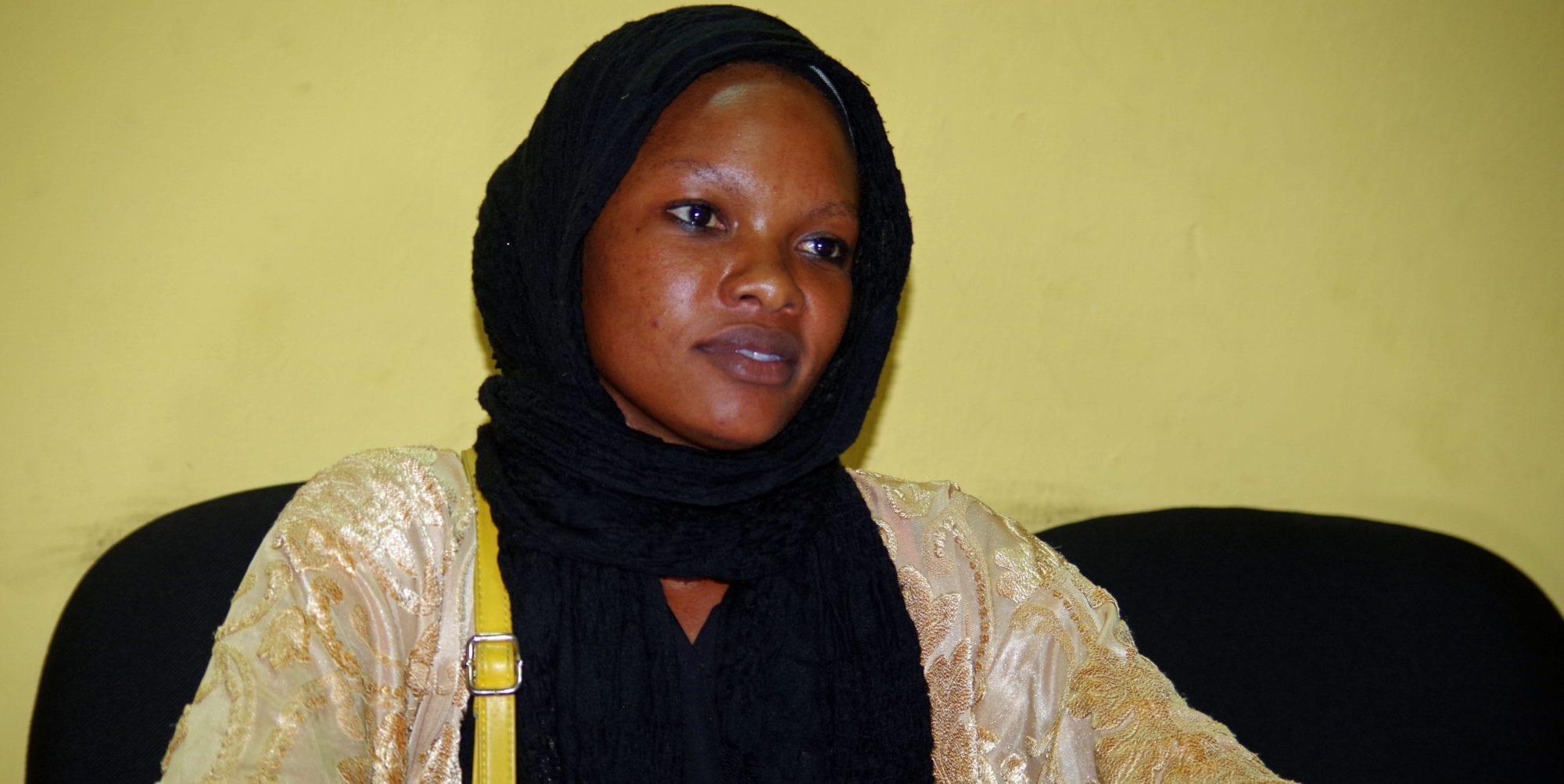
Nov 28, 2017
The Central Organization of Trade Unions–Kenya (COTU-K) said the country’s recent decision to lift its ban on workers migrating to Qatar and Saudi Arabia for jobs is “ill advised,” and urges the government to keep the ban in place until the Ministry of Labor provides a report that shows working conditions have improved.
“The ban was put in place after Kenyans suffered and many died in the Middle East,” says COTU-K Secretary General Francis Atwoli. Lifting the ban, which takes place at the end of November, will allow “Kenyans to be enslaved, tortured and killed in Gulf countries,” he says.
In 2014, Kenya banned some 930 recruiting agencies after reports of abuses, including murder, of Kenyan workers in the Middle East. Many Kenyans migrate for jobs, most employed as domestic workers and construction workers, because they are unable to find jobs at home.
Recent Solidarity Center interviews with Kenyans who had returned from jobs as domestic workers in Saudi Arabia highlight the brutal treatment they receive by employers, who force them to work without breaks day and night and often beat them and sexually assault them. Many, like Mwahamisi Josiah Makori, return home unpaid after months of abuse.
Together with the Solidarity Center, the Kenya Union of Domestic, Hotel, Educational Institutions, Hospitals and Allied Workers (KUDHEIHA) is reaching out to communities in the Mombasa area with a series of forums on migrant workers’ rights. Unscrupulous labor brokers promise workers higher wages than what they will be paid, describe working conditions far less grueling than reality, and do not show workers their contracts until they are at the airport or bus station. Frequently, the contracts are written in Arabic or a language the workers cannot understand, and the contracts may even change after they arrive at their destinations.
“The majority of African countries have banned their citizens from working in these Gulf countries,” says Atwoli. “Kenya should follow suit.”
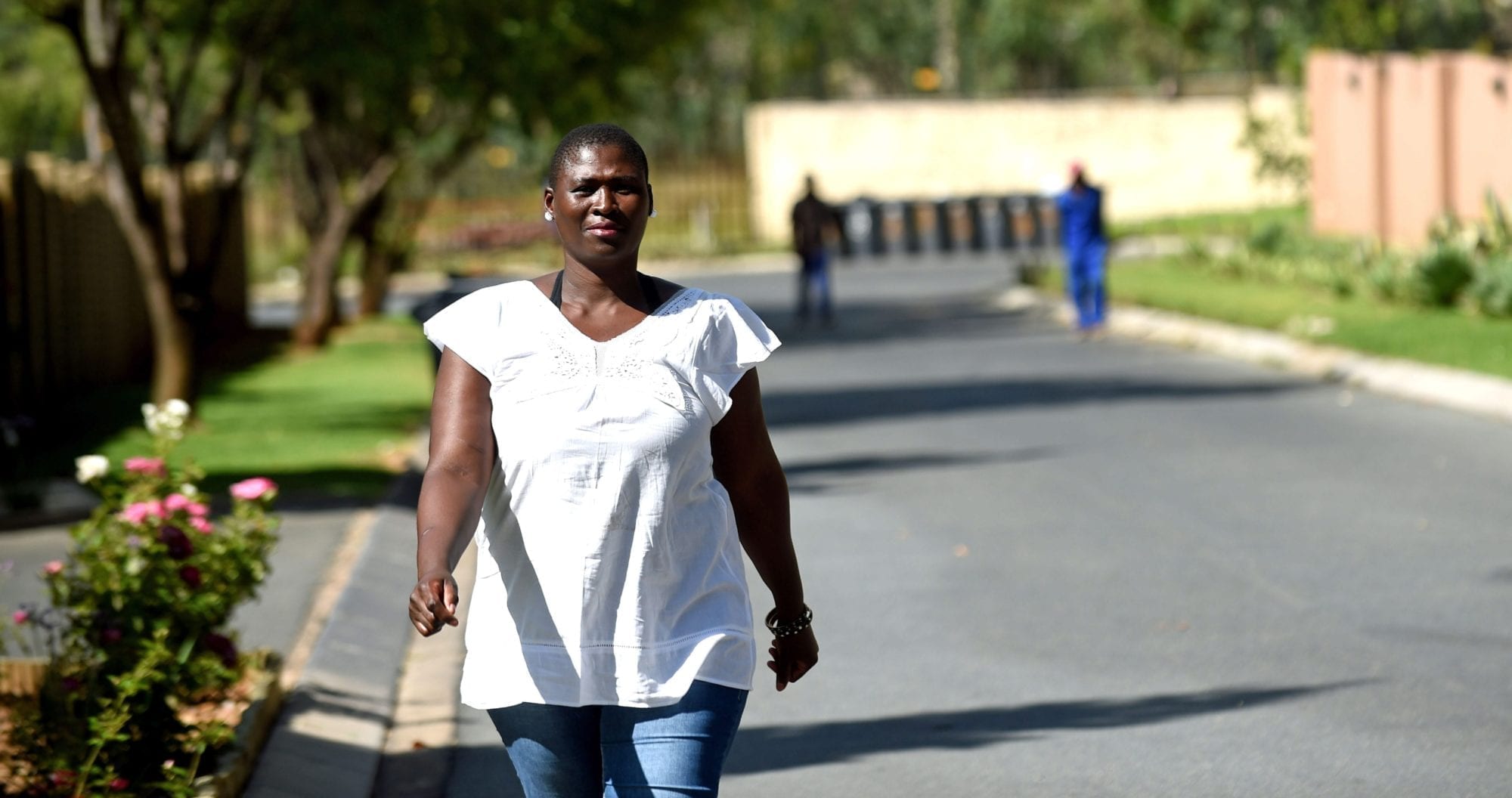
Sep 22, 2017
Prexedes, a domestic worker from Zimbabwe in South Africa, says migrant workers in South Africa often are paid lower wages and suffer harsher working conditions than their South African counterparts. Supporting her three children on her own, Prexedes struggled to pay for transportation to work and food for her family, and often worked overtime for no pay.
But now that she joined the South African Domestic Service and Allied Workers Union (SADSAWU), a Solidarity Center partner, she says “a lot has changed.”
“Since I have joined a union, my life has improved, with the hours I am working and the salary I am getting,” she says.













